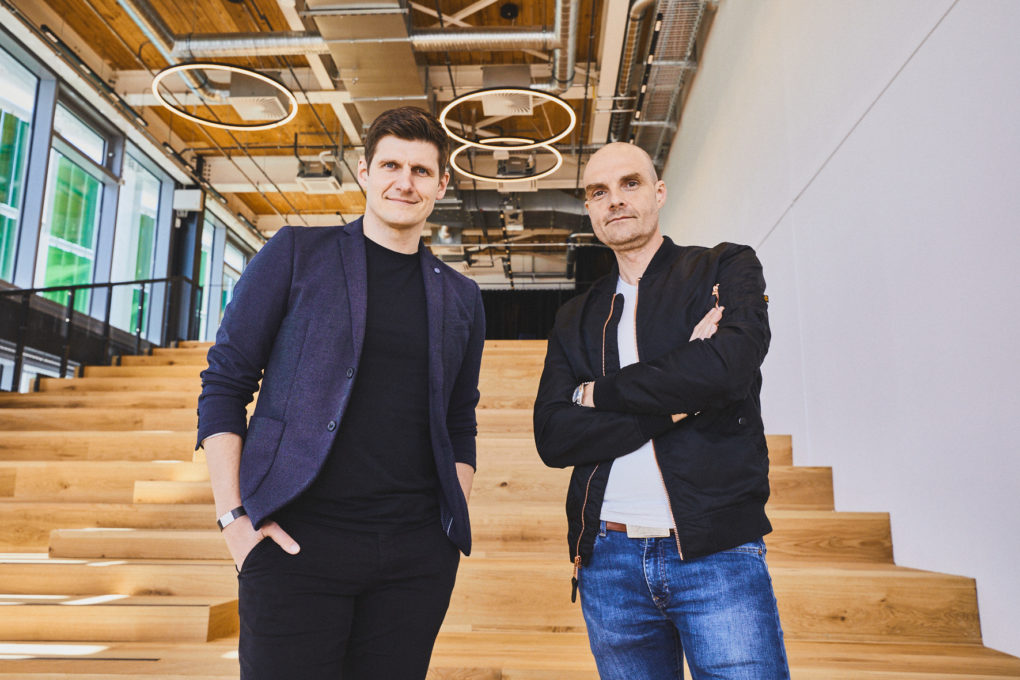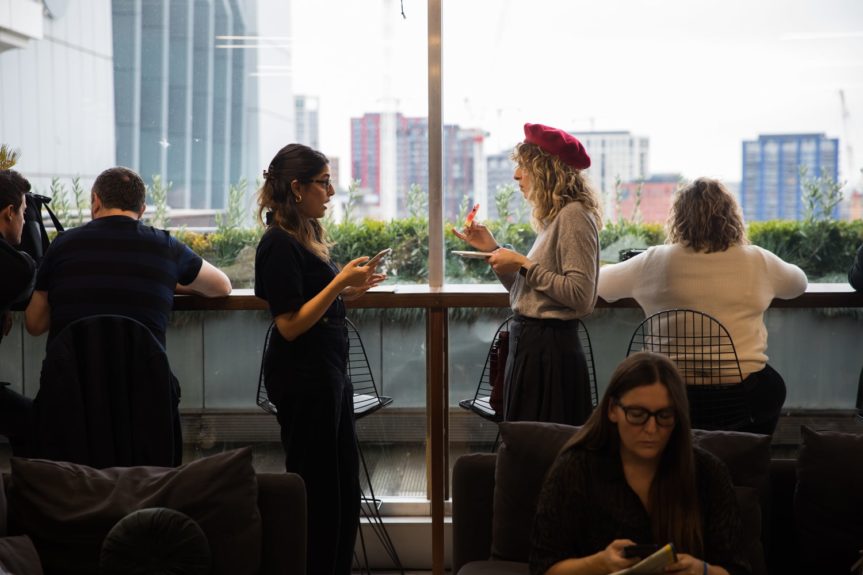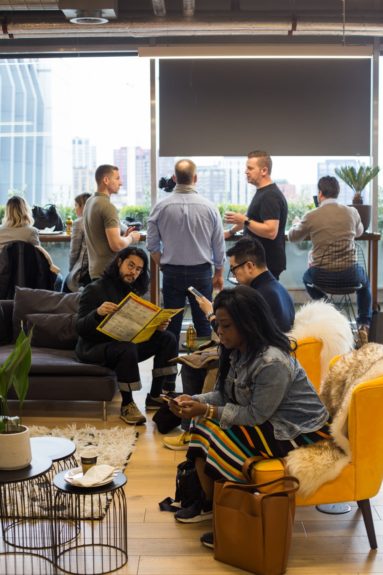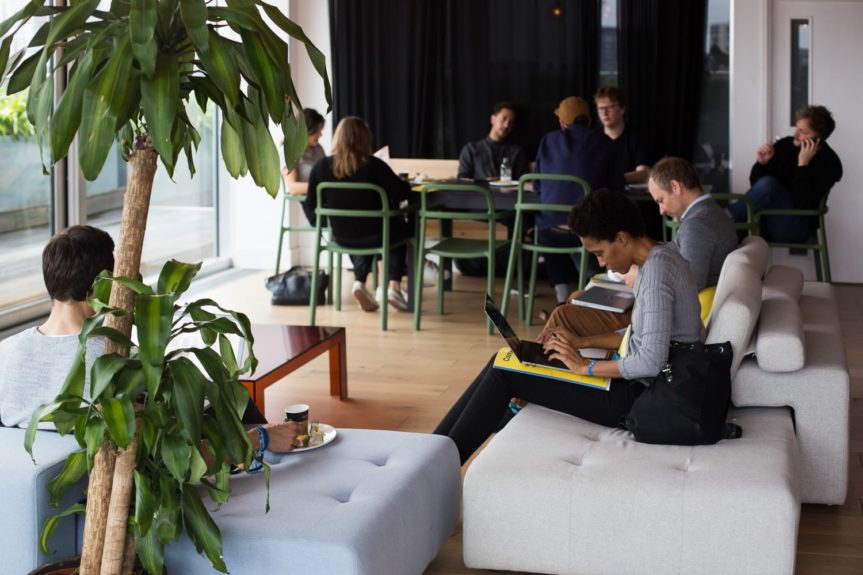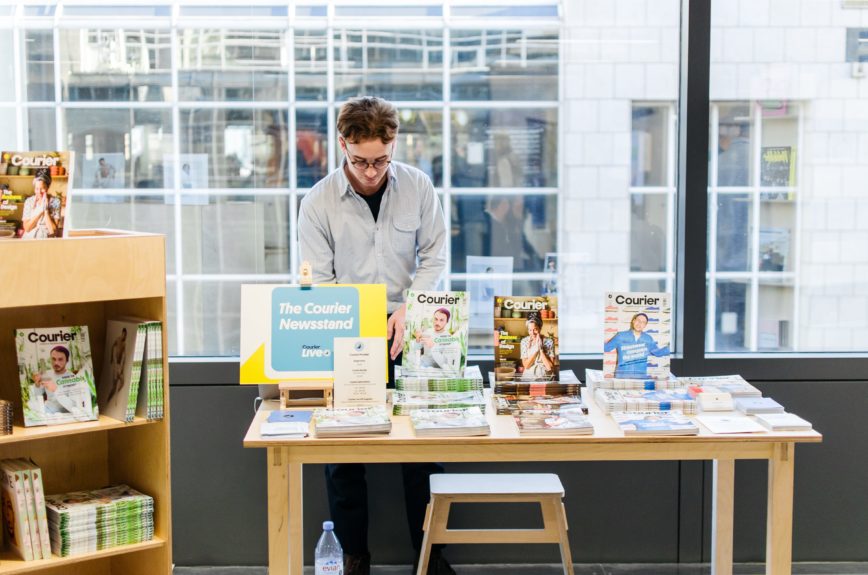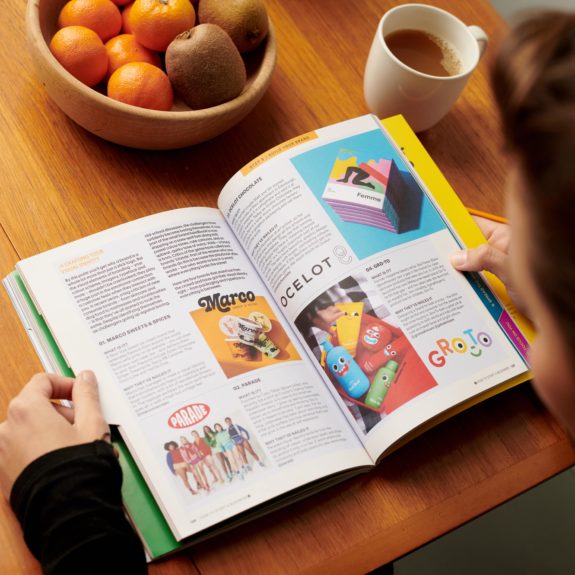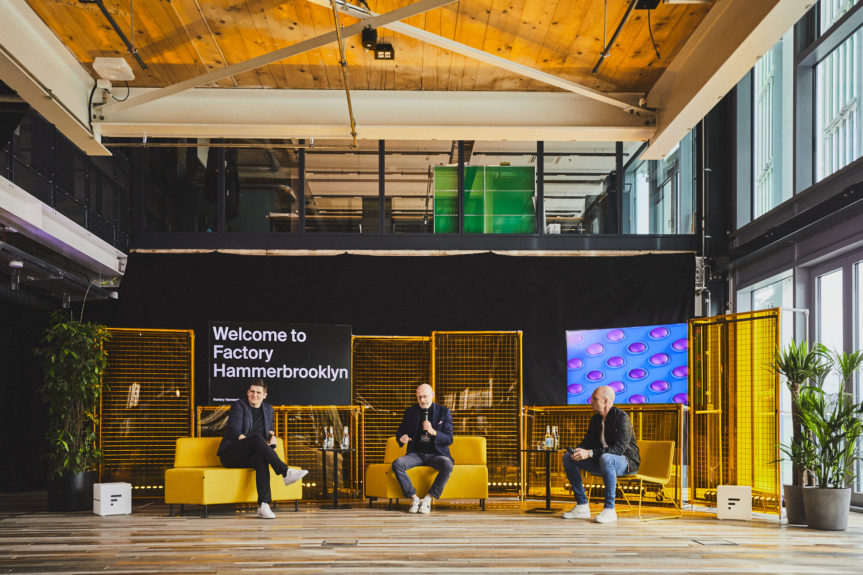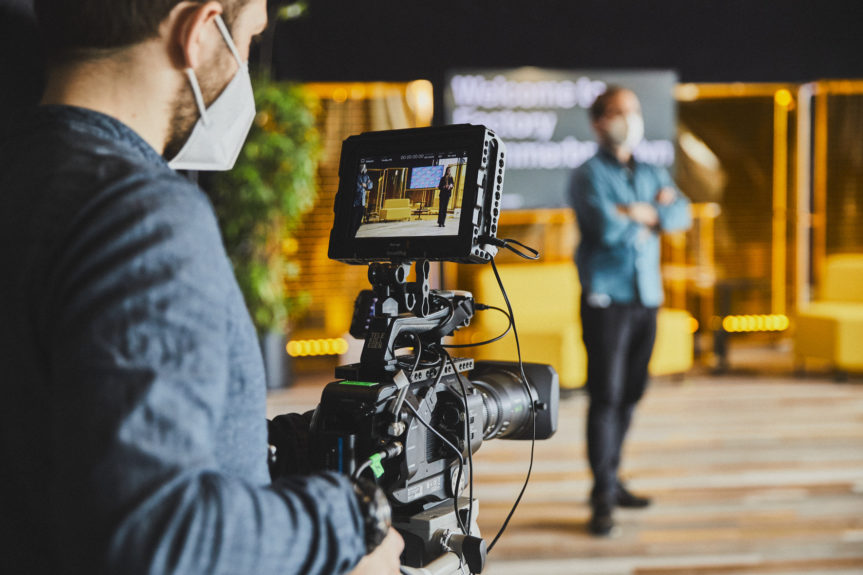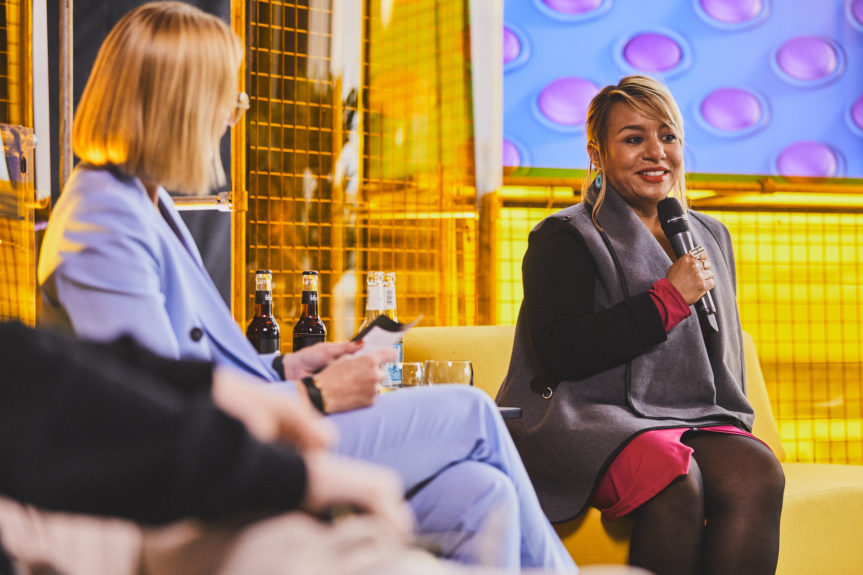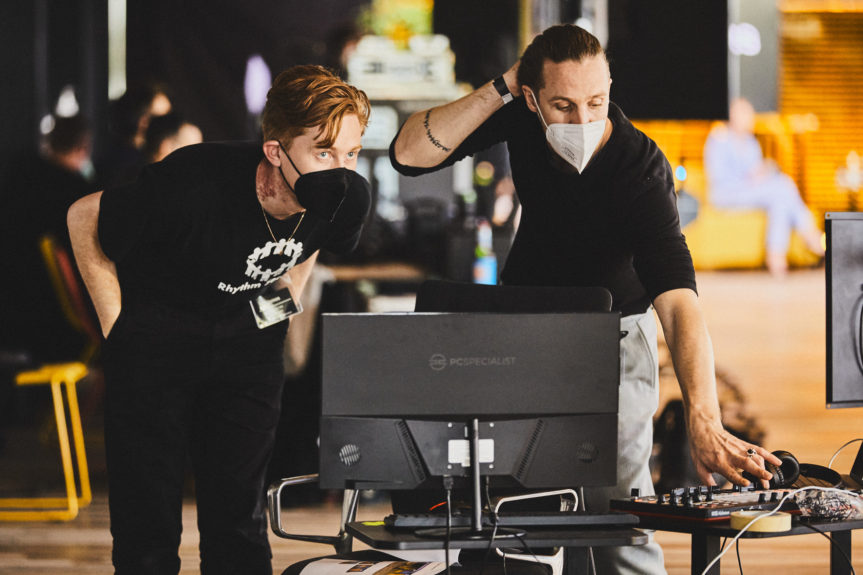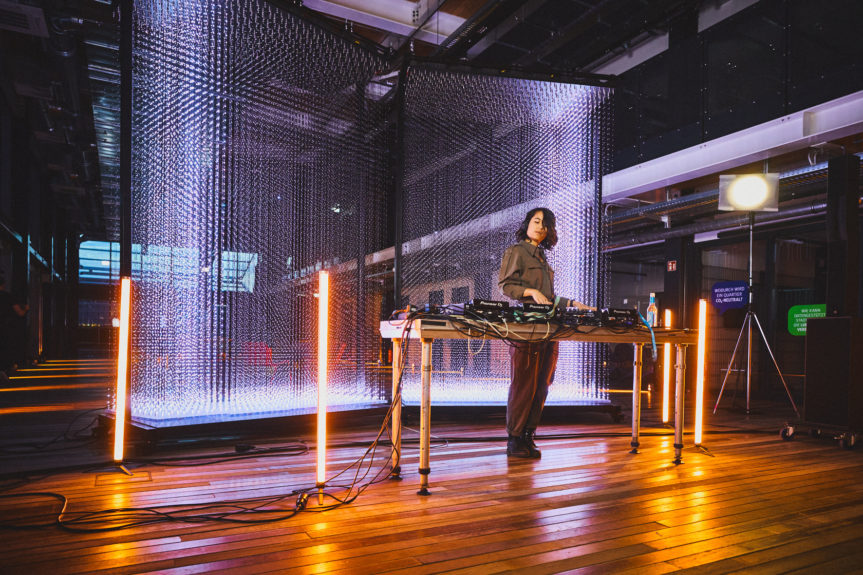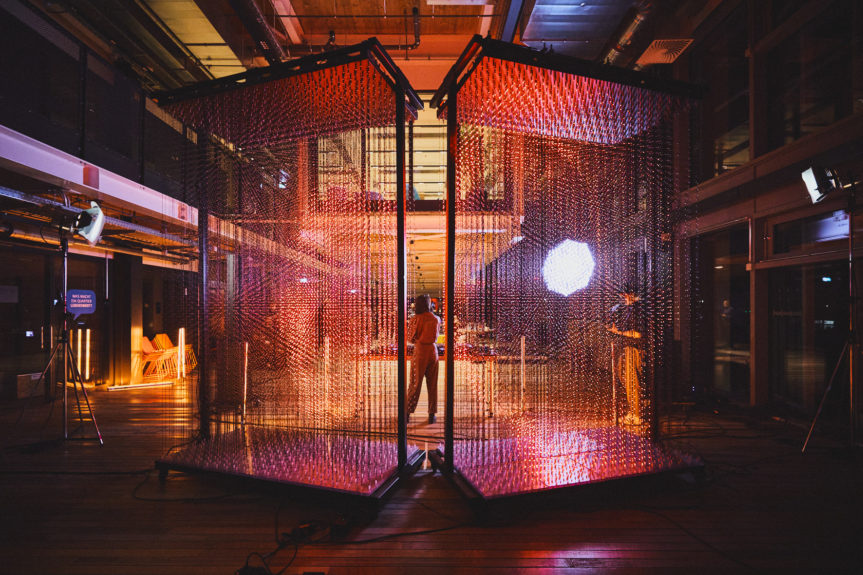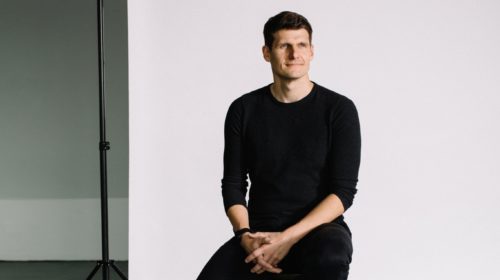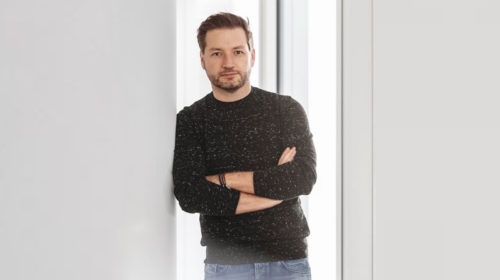
May 13, 2022
In Conversation with Jeff Taylor, Founder of Courier Magazine
Martin Eyerer: Hi Jeff, very pleased to meet you. Although due to the current circumstances, we’re having this conversation digitally, you already visited us at Factory Berlin a few months ago, right?
Jeff Taylor: Likewise, Martin and Nico. Yes, I dropped by Factory Berlin one (unusually for Berlin in Winter!) sunny morning. It was one of those mad circuits that you do when you’re in town somewhere else for a day. However, Factory Berlin was definitely a highlight of that trip. Congratulations, it looks awesome, it was really great seeing the community life.
Martin: Thank you, Jeff, appreciate your feedback. I read a couple of interviews you gave in the past and I remembered the way you described your magazine in just three words: “serendipitous, humble, diverse.” So I got curious to hear how you would describe Factory Berlin if you only had three words? What were your takeaways from your first visit to Factory Berlin? Why do you think we attract the community of creators?
Jeff: Number one – communal; I got the sense that it was a really great and strong community and vibrant communal life. Even though it was quite early in the morning, I could see lots of people around chatting and collaborating on their things, which seemed terrific. You just sort of occupied a great space letting diverse, ambitious, and creative people intersect and create, and really captured quite a lot of the heart of the scene here in Berlin, which is really exciting. And it just seems you guys are really agile and nimble as well, and that even the pandemic hasn’t slowed you down for a bit. You’ve kept actually growing and adapting to the new reality.
Martin: Would you draw any parallels between Factory Berlin and Courier Magazine, and if so, what would that be?
Jeff: I’d say that our missions are quite similar: Courier’s mission is to build a big community of people who want to work and live on their own terms. And it feels to me that you guys at Factory Berlin are a real facilitator and an engine of that spirit, not just in Berlin and Hamburg, but actually reaching a broader audience as well. I think we’re both aiming at the same target in a lot of ways, trying to do the same thing, which is to support and nurture talent.
Martin: Let’s interrogate the word ‘serendipity’. How do you describe it? Which role does it play in your life, and how has its meaning changed with the time for you personally?
Jeff: One of my observations of entrepreneurship was that the media in this sector tries to distill everything down to “10 tips to be a billionaire by Richard Branson” or something like that. And the reality is serendipity and luck can play a tremendous role, and a lot of the time it’s down to skill: you can go left, and I can go right, and we can both succeed. We can both fail as well. I’m not for a minute suggesting things like training, experience, and good old-fashioned grunt and hard work aren’t essential too, but it’s dishonest to suggest that factors outside our control, like luck, aren’t in the mix too. Serendipity is slightly different, though, as it is a ‘luck’ we can somewhat control. I’ve always found if I put myself in interesting situations and surround myself with diverse individuals, good luck seems more likely. I genuinely believe we live in the age of the polymath, and polymaths excel when they cross different crossroads and wander into different unexpected territories and fuse previous learnings and early exposure to other sectors together.
“We live in the age of the polymath, and polymaths excel when they cross different crossroads and wander into different unexpected territories.”
Jeff: My own career path comprises many serendipitous things, and then I’ve always tried to take advantage of them. I wanted to design Courier as a place where you might be working in the fashion industry, but I want you to be exposed a bit to what might be going on in the food sector and the tech sector, and various other sectors. We don’t just learn from our own category. I think our experiences are much broader than that, and that’s what I mean by serendipity and its role at Courier, definitely. What about you, Martin and Nico?
Martin: I actually use the word ‘serendipity’ when I explain the essence of entrepreneurship. I believe that serendipity still hasn’t become a normality in our society and is not a part of daily life that we practice at Factory Berlin and you – with the Courier community. At least in Germany, in my opinion, serendipity has always been suppressed by education as well as corporate and industry mindsets, which make people have straightforward thinking and avoid looking left and right or seeking new opportunities. That’s why we believe that entrepreneurship plays a crucial role in innovation and in societal change, and we always encourage our community to look left and right and stimulate opportunities for that. I know it’s just one of three words you described your business with, but I wanted to ask you when have you become aware of serendipity as a significant factor for the future?
Jeff: I was fortunate enough to go to a school that sort of prided itself on all-rounders, so pupils had to do everything. We had to play quite a few different sports, study music, and do languages. By nature, I’m quite curious and quite interested in lots of things going around. Somewhere along the line, my degree was in economics, which is quite unrelated to the advertising career I went into. And then very unrelated to the media business I’m in right now. I think it is through serendipitous events along the way that we do cross tracks. And I completely agree with you here: big corporations focus on maintaining discipline and focus, and on weeding out the outliers that might challenge the stability of the operation. Serendipity and luck somehow have to be isolated and kept away, which is probably right for them, until the moment they’re so disrupted that they need to adjust. But for our sector, serendipity and curiosity are so critically important.
I do find that people, who come from professional disciplines, where serendipity and polymathy are not particularly highly rated, tend not to be as successful in starting businesses like those, who come from maybe less traditional business backgrounds but understand the benefits of community, conversation, and luck of discovering things along the way. I think that’s fascinating.
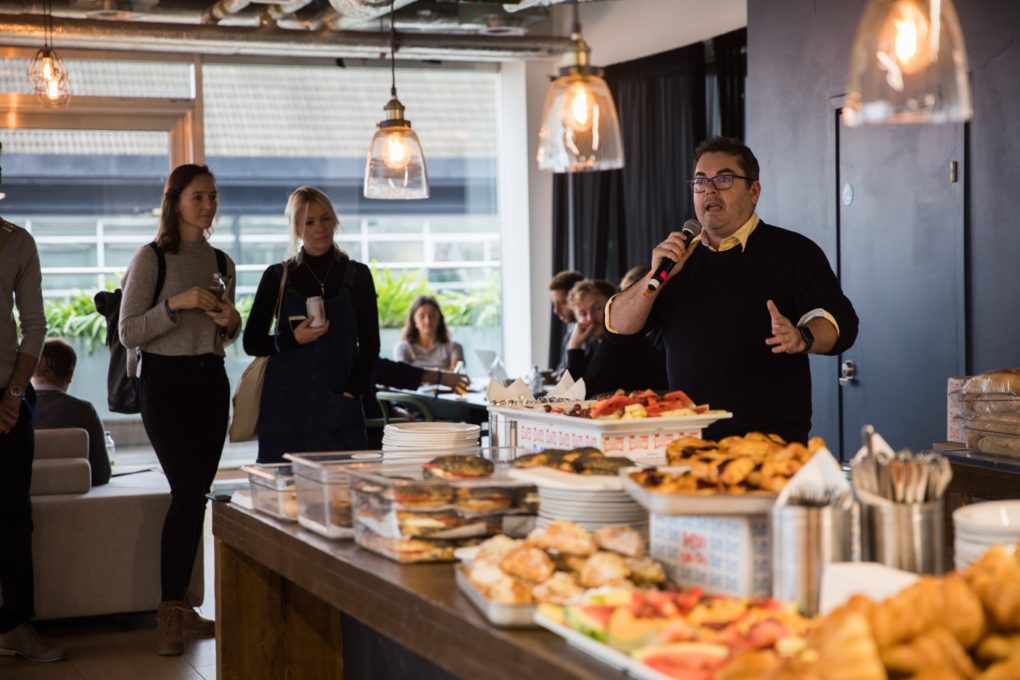
Nico Gramenz: Since we started talking about curiosity, I think that generally, curiosity is not something that is given, and we can expect it from our target group.
You cannot just say: “Hey, be curious!” It’s not working. However, the more that startups, organizations, and founders understand this idea of serendipity, the more successful they become. To me, this is the key opposition to the industrial, military, and corporate life which I have lived before joining Factory Berlin: success is still normally measured by wealth and social status, exemplary behaviors would be learned and applied for the next 10 years. We know that this is not functioning any longer. So even if you learn something, it will not be relevant for the next 10 years, and you will have to re-adapt.
I left Siemens because, somehow, I was aware that within Siemens, I could not change the organization, but probably from the outside, I can help this organization disrupt.
What would be very interesting for me to hear from you is how do you access your target group, Jeff? And if this is your mission, how do you expand the target group of Courier Media?
Jeff: At Courier, we’ve always made an assumption that if we just put all our effort into the product, we wouldn’t really need to do too much work on promotion. For me, that’s sort of the sign you’ve got it right. You get sharing and referral when you deserve it. You can’t force it. When people find something they love, they can’t wait to share it. And that’s especially important with our physical products: we love it when readers hand their copy over to someone else, and they can get an instant sense of it.
“You get sharing and referral when you deserve it. You can’t force it. When people find something they love, they can’t wait to share it.”
Jeff: What’s fantastic about print products is that they sit on people’s coffee tables and office desks for months. People collect them and use them as decorative objects. And then, of course, our digital products extend the print universe further, people can just flick them across to each other. So at Courier, we’ve never focused too much on trying to promote the magazine. We’ve just tried to stay really close to our audience, understand what their needs are, and tried to make the best possible product that we could, frankly speaking.
I think one advantage we have is that a lot of media is just a read for entertainment, whereas Courier is made for consumption. I mean, partly it’s a pleasant read, and we want readers to enjoy looking at it, but actually, there’s a real utility of Courier. We just love seeing someone’s copy of Courier marked with post-it notes and filled with comments and remarks on pages – when our audience really uses it as a workbook. I think that helps us a lot at Courier in staying focused on what we’re here to do, which is to help people make that transition to a life on their own terms and equip them with the learning, inspiration, and required connections.
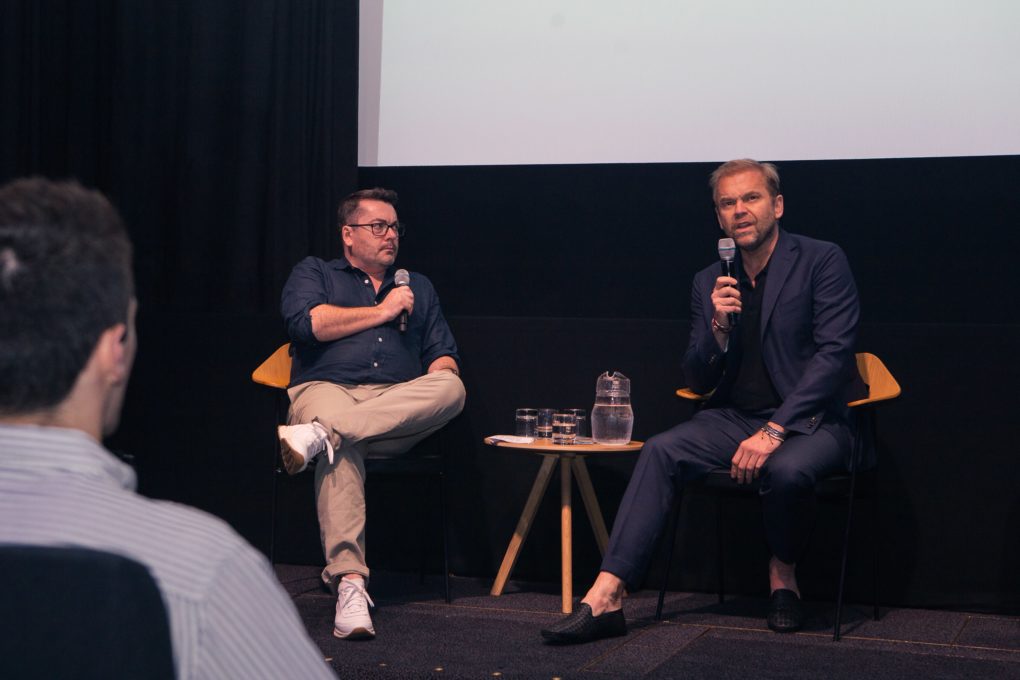
Nico: Who is the core audience of Courier Magazine? Are those individuals who want to start a business, or grow a business and scale it, or are those SMEs and the corporation innovation teams, e.g., as well?
Jeff: I think with any product, you end up with audiences that you didn’t necessarily intend to go after. Funny enough, I think at Courier, we didn’t imagine we would have so many management consultants, innovation teams, and investors (i.e., ‘grown up’ business people!) reading Courier. But on the flip side, we’re very clear about who our bullseye customer is: they are 24, 25, 26-year-old, setting out to change their lives. They’re either on the path where they’re looking for inspiration or maybe looking for some confidence. Maybe they’re looking for ideas, or they’re in what we call an on-ramping phase. They’re busy with making a go of it, getting started, and dealing with the hundreds of random questions that you get as a founder.
I often say that starting a business is like an exam you can’t study for. There are a thousand things that you probably need to know, but you don’t know which of those you’re going to require at what point, but you are expected to understand HR, IT, product marketing, finance, and so on. Courier is here to help guide you for all those questions that not only do you not really have the answers to in a lot of cases, but you also might not even have a kind of background or understanding of the category that the question comes from. So we’ve always tried to stay really focused on what our audience is, and what are the problems that they face. We just want to keep doing a better and better job, and if we pick up other audiences along the way, that’s awesome, however, we stay very focused on our core audience and members.
“I think with any product, you end up with audiences that you didn't necessarily intend to go after. Funny enough, I think at Courier, we didn’t imagine we would have so many management consultants, innovation teams, and investors.”
Martin: Is having a physical product your biggest curation factor? Throughout my career as a music producer, I released more than 250 records. When digital formats came up, I saw one big plus: suddenly I gained an audience in South America and Australia, and all possible remote corners of the world, which was actually really nice to see. They would have rarely purchased a physical vinyl due to high shipment rates.
Jeff: I tend to think of different media forms as a kind of like a toolkit, and sometimes a hammer is the right tool and sometimes scissors are the right tool. For us, print and physical products are great mediums to tell really rich stories in long form, combining photography and imagery in a way that you often can’t do digitally. They’re really great for one bit of what we try to do with Courier, but on the flip side, our newsletters reach over 140 different countries and over a million people every week. To your point, that’s an opportunity that just is hardly possible to achieve physically.
Physical products have a long lead time, so they’re naturally better at less instant coverage, whereas email and social media let us be much more reactive to things that are happening in the real world. I think we’re the luckiest kids in the class because we’re not bound to one medium, and we’re not from the business model that forces us to exist as one medium. We get to express Courier in all sorts of different mediums, whether it’s physical meetups, print products, online, or audio. Next year, I want to do a lot more video formats at Courier. They’re all great mediums, and can all do different jobs for our audience in helping us be that essential sidekick that they need.
Martin: What are the next big plans you have for Courier Magazine and your audience? Is there any new transformation you think of undertaking? Perhaps an active community building? We did it here at Factory Berlin in 2019, really focusing on actively fostering and driving innovation so that we do not just know that there’s innovation happening but are its key drivers.
Jeff: Digital is really exciting for us. Our digital audience is growing immensely, over 600% this year. During COVID-19 print has struggled a little, because obviously, all the stores where our core audience shops stayed closed. But we’re planning aggressively to do a print distribution around the world as well. Essentially, our goals for next year are just to keep growing both our print and our digital operations and hopefully bring our events back. We used to just love holding face-to-face events back to that serendipity point. What was so great about it was the serendipitous nature of face-to-face engagement that you just can’t get with a digital event. Where people over a glass of wine and a snack would just get talking and discover that they had things in common or could help each other, but never would have met each other, had they not been at our events. Next to that, as I said earlier, I think we feel there’s an enormous opportunity in the video formats. Some platforms like Instagram are maybe not so natural places for Courier to be, but other platforms like TikTok and YouTube, I think are really great places for us to be. And just because of our sort of size and the speed of our growth, we haven’t had the resources to spare on that. Whereas next year, we really aggressively want to get into that, alongside keeping up print and other digital forms growing really quickly.
What’s next for you guys? Chatting here at Factory Berlin, it seems events play a massive role for you guys. And of course, the community is a constant, it seems.
Martin: Our vision at Factory Berlin is to give every creator an empowering network. Our network helps creators thrive through a supportive, diverse, collaborative and curated community. Events have always been a significant tool for us to energize, grow and shape our network. Experiencing our events, one will essentially be immersed in the “Factory Effect”, an ultimate atmosphere of serendipity and the vibrant energy created by the collaboration between creators in our network from various backgrounds. We just love our Community Breakfasts and Check Out Drinks series, where the community simply gets down together to share a good time and let the serendipity do its work.
Pre-pandemic, we have hosted more than 400 events a year, which breaks it down to sometimes holding more than 2 events on one day.
Of course, COVID-19 has disrupted the usual way our events had been programmed and executed, but our team showed incredible agility and came out with new solutions that work successfully in a digital and a hybrid way. For instance, we celebrated the launch of our network in Hamburg in May with a hybrid kick-off event that we streamed online on our social channels. We also adjusted one of our flagship mentorship programs Stealth Mode to a new, COVID-19-safe reality that is optimal for the remote experience.
Today, we closely monitor government regulations for all in-person events and always put the health and safety of our community and guests first.
“COVID-19 has disrupted the usual way our events had been programmed and executed, but our team showed incredible agility and came out with new solutions that work successfully in a digital and a hybrid way.”
Nico: Jeff, I have been curious to learn how do you measure media KPIs more on a qualitative side and not on the financial side? What is driving you every month, if you look at your business?
Jeff: I’m glad you flagged that because of course we do have quantitative KPIs as any business does, but actually we really value a lot of qualitative KPIs too. The biggest one that we focus on is whether people actually consume what we create. Digitally, it’s really easy to understand to an extent: you can see an opening rate of an email or the number of times people visit a page. However, in real life, it’s much harder to tell, as a lot of people buy books and magazines, and then leave them just sitting on a shelf or on a coffee table looking great. This is where I’m really missing events, because, in addition to all the good stuff that happens for the audience during an event, I get to just go out and talk to members of Courier community. I’m sure you do the same at Factory Berlin. You can just talk to your customers and get a sense of what’s going on and what they need. We spend a lot of time trying to figure out, qualitatively, how essential we are, and how useful is what we’re doing. That’s a massive KPI for us.
Another really important KPI is actually how much are we as a team enjoying what we’re creating. This can sound like that’s quite a self-indulgent metric – to some extent, it is, as I want the team to be happy and motivated and enjoy what they do, this is how we can make a better product. I suspect, we started Courier almost for ourselves. If we didn’t make Courier, we would buy a Courier. We would need it ourselves. So that’s always been a great barometer for us. Are we interested in what we’re writing about? Are we finding what we’re doing useful and entertaining and engaging? Because if we’re not, there’s a good chance we’re probably off-piste for the audience as well. So the second qualitative factor I look at a lot is just: are we enjoying and are really in love with what we’re making right now? And if we’re not – we have to urgently find out what’s the problem there. But of course alongside that, financial metrics are essential to us. A successful business is one that can make a profit and stay open year after year, and that requires rigorous attention to numbers. But financial return certainly isn’t the only factor in how we make decisions, which I think makes us quite different from a lot of the media industry.
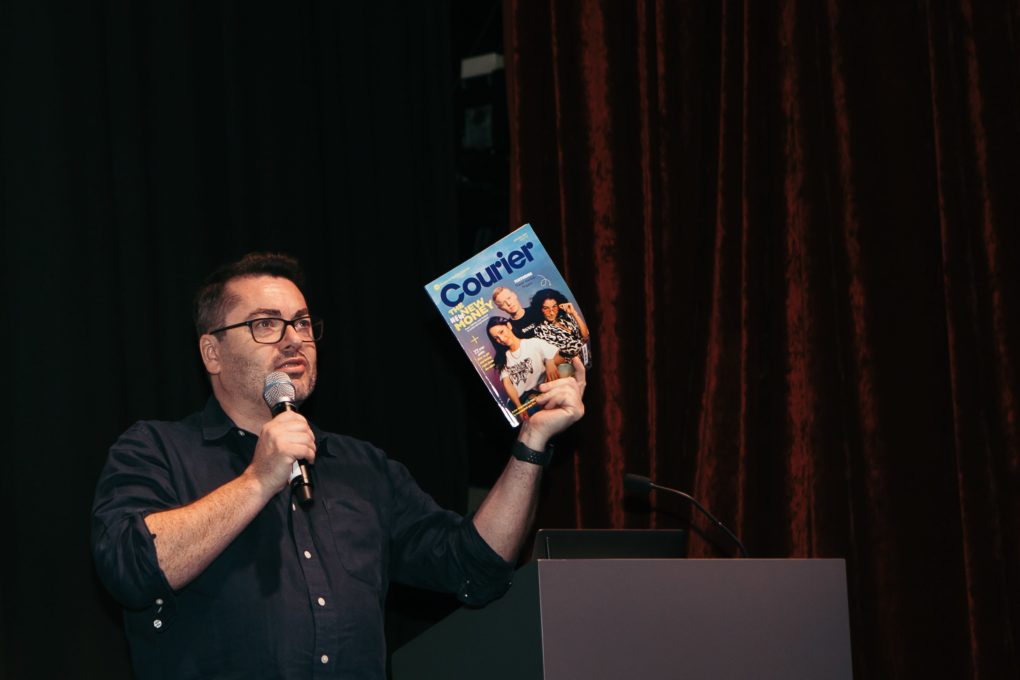
Nico: Where is your core readership located? Does Berlin play a significant role for you when it comes to community building?
Jeff: Lately, we have become more US-centric, as our audience has exploded in the US. In fact, 70% of our audience resides in the US right now, which for a UK publication, is not necessarily what we expected, although we’ve always thought of ourselves as global media. However, the Berlin scene is a significant audience for us. I believe that Berlin and Lisbon are probably our true spiritual hubs in Europe, so a deeper relationship is definitely something we would like to build there in the future.
Martin: What are your thoughts on Berlin vs. Lisbon? Where do you see the two cities in terms of our scene?
Jeff: I think it’s interesting that it comes back a little to why people choose mostly either of these cities as places to start a business. I think those cities just allow one to have a healthy work-life balance, and this is so important. There is a desire amongst founders to locate themselves in a city that works on more than just a business level. Although, of course, the business level is really critical.
Berlin is a great city, it’s got fantastic transportation links, a wonderful infrastructure, it has got an incredibly innovative and diverse scene, and it’s really strong in those elements. Lisbon’s really interesting. I’m not entirely sure that anyone would have predicted Lisbon 10 years ago the same way they would have predicted Berlin, but I think what Lisbon does get right is that it’s a really pleasant place to be. No surprise that a lot of talented people have congregated there, and the weather certainly helps, but alongside that, there is a proactive government and a willingness at a policy level to really encourage innovation and foster people coming from other parts of the world to start businesses in Portugal and Lisbon. I’m always surprised about how much Lisbon has been attracting amazing talent, but Berlin has probably got a more mature innovation scene. Berlin is arguably, alongside London and probably Stockholm, one of the key drivers of innovation in Europe.
“Berlin is arguably, alongside London and probably Stockholm, one of the key drivers of innovation in Europe.”
Martin: Are there any rising innovation hubs outside of the EU that fascinate you? Nico and I have been lately investigating a lot of Tirana, the capital of Albania, and were really impressed to find incredible preconditions of education and a vision of modernity. We believe that this country can change the whole Balkan region, and is totally on the rise at the moment.
Jeff: That’s really exciting! Actually, if you move down from the Baltics, the entire Former Eastern European block has just seen remarkable leaps that some of those economies have made in terms of fostering innovation and becoming great places to start a business. I think right through that Eastern European belt, there’s this great stuff going on. We’re actually investing quite heavily in a broader global correspondent network so that we can tell the stories from these markets, where previously there haven’t necessarily been a lot of freelance pitches for stories. That will enable us to tell authentic local stories.
I think that’s one of the things that’s so exciting about the revolution, is that it can happen in all corners of the world. While 30-40 years ago, you had to be in one of the major industrial centers to have a chance of launching something, nowadays such a geographically egalitarian approach won’t work. I think the one thing that it does require are sympathetic policymakers and sympathetic officials, the government that can clear roadblocks and ease the bureaucratic red tape.
Martin: Absolutely. A hundred percent agreed. Nico and I discuss a lot which transformation processes old industry power regions need to go through to prevent big disruptions. We actually also see a lot of countries outside of Europe that go with a triple-speed in the direction where we haven’t even arrived yet, and would definitely love to share our expertise with the relevant stakeholders and decision-makers.
Jeff: That’s an amazing ambition, and I am excited to see what’s next for Factory Berlin. Thanks for having me today, I am looking forward to sharing Courier’s journey with your community in the future.
Martin & Nico: Likewise. We are very grateful for talking with you today, Jeff! We very much look forward to seeing Courier Magazine evolving and reaching new territories and hope to kick off exciting collaborations between our communities in the future.
